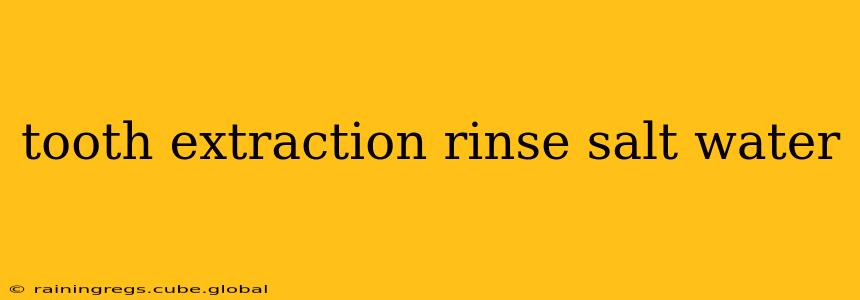Having a tooth extracted can be a bit unsettling, but proper aftercare is crucial for a smooth recovery. One of the most commonly recommended home remedies for post-extraction care is rinsing with salt water. This simple yet effective technique can significantly reduce discomfort, promote healing, and prevent infection. Let's delve deeper into why and how this works.
Why is Salt Water Rinse Recommended After Tooth Extraction?
Salt water, or saline solution, is a natural antiseptic. This means it helps to kill bacteria and reduce inflammation, both vital factors in the healing process after a tooth extraction. The salt's osmotic properties draw out excess fluid and debris from the extraction site, preventing the build-up of bacteria and promoting faster healing. This reduces the risk of a dry socket, a painful complication that can arise after an extraction.
How to Properly Rinse Your Mouth After a Tooth Extraction?
The proper technique is essential for effective rinsing and to avoid dislodging the blood clot crucial for healing. Here’s a step-by-step guide:
- Prepare the solution: Mix 1/4 to 1/2 teaspoon of salt into 8 ounces (about 237 ml) of warm water. Ensure the salt dissolves completely.
- Gently rinse: Gently swish the salt water around your mouth, avoiding the extraction site directly. Focus on rinsing the surrounding areas. Avoid forceful rinsing or spitting, as this can dislodge the blood clot.
- Duration: Rinse for about 30-60 seconds, then gently spit the water out.
- Frequency: Repeat this process several times a day, as directed by your dentist or oral surgeon. Typically, rinsing 3-4 times a day is recommended.
How Often Should I Rinse with Salt Water After Tooth Extraction?
The frequency of rinsing will depend on your individual needs and your dentist’s instructions. Generally, rinsing 3-4 times a day is a good starting point. However, over-rinsing can irritate the wound. Always follow your dentist's specific advice.
What Other Things Can I Do to Help with Healing After a Tooth Extraction?
While salt water rinsing is a valuable tool, it’s only one part of proper post-extraction care. Other crucial steps include:
- Avoiding strenuous activity: Avoid intense physical activity for at least 24 hours after the extraction to minimize bleeding and swelling.
- Eating soft foods: Opt for soft foods that don't require extensive chewing, such as yogurt, applesauce, mashed potatoes, and soups. Avoid straws, as the sucking action can dislodge the blood clot.
- Applying ice packs: Applying ice packs to the affected area can help reduce swelling and pain. Follow your dentist's instructions on how often and for how long to apply ice.
- Taking prescribed medication: If your dentist or oral surgeon has prescribed pain medication or antibiotics, take them as directed.
What are the Signs of Infection After a Tooth Extraction?
It's vital to monitor the extraction site for signs of infection. These may include:
- Increased pain: Pain that worsens rather than improves over time.
- Swelling: Significant swelling or redness around the extraction site.
- Fever: A temperature above 100.4°F (38°C).
- Pus: Noticeable pus or discharge from the extraction site.
- Bad breath: Persistently bad breath or a foul odor coming from the mouth.
If you experience any of these signs, contact your dentist or oral surgeon immediately.
Can I Use Hydrogen Peroxide to Rinse After a Tooth Extraction?
While hydrogen peroxide has antiseptic properties, it's generally not recommended for rinsing after a tooth extraction. It can actually damage the healing tissues and potentially delay the healing process. Stick to the salt water rinse as directed by your dentist.
When Should I See a Dentist After Tooth Extraction?
Regular follow-up appointments are essential for monitoring healing progress and addressing any complications. Always follow your dentist's instructions regarding post-operative check-ups. If you experience any concerning symptoms, don't hesitate to contact your dentist.
Remember, this information is for general knowledge and should not be considered medical advice. Always consult your dentist or oral surgeon for personalized post-extraction care instructions. They can assess your specific situation and provide the most accurate and effective recommendations.
